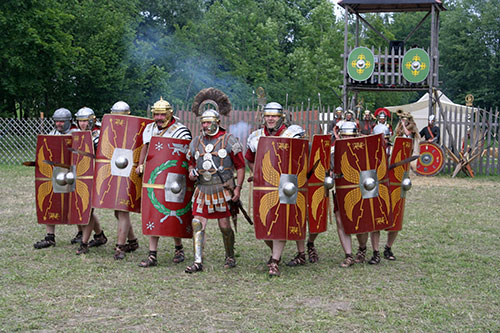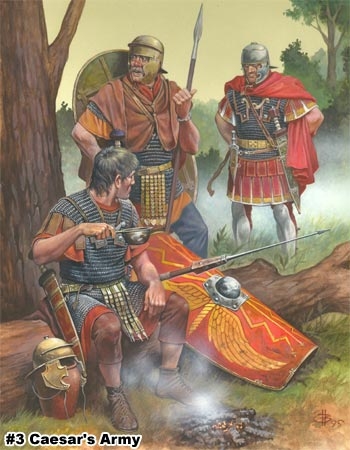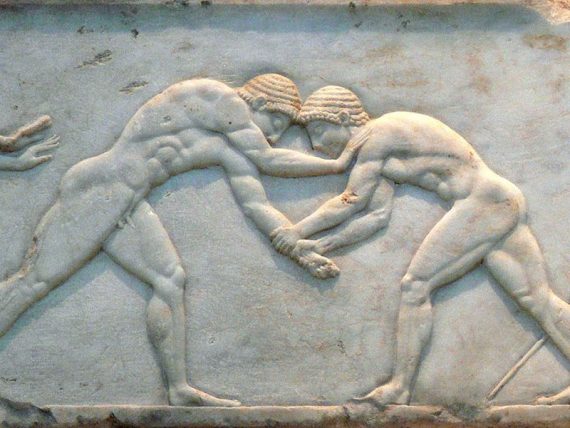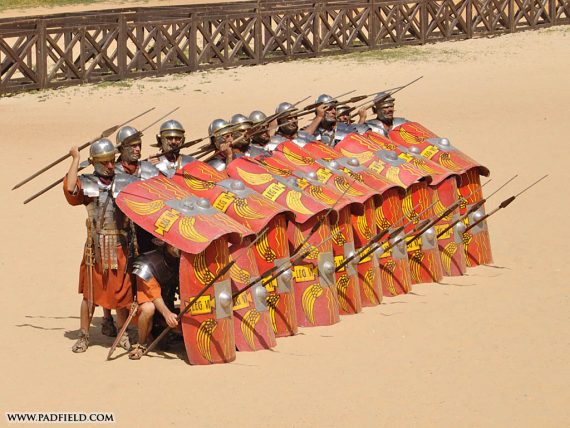In Ephesians 6:15, Paul instructs Christians to “shod your feet with the preparation of the gospel of peace.” This is another piece of the armor of God, even though Paul doesn’t specifically mention a piece of armor. Since he writes about having something on our feet, he is clearly referring to the sandals that Roman soldiers wore into battle.
So Ephesians 6:15 is referring to the Sandals of the Gospel. And as we did with the belt of truth and breastplate of righteousness, we will consider the sandals in three ways.
First, we will look at how the sandals were used by the Roman soldiers in battle. Second, we will consider how Christians are to use them in spiritual battle. Finally, we will learn how Christians can put on the sandals of the gospel as we fight alongside Jesus in spiritual warfare.
The Sandals for the Soldier
 The sandals of the Roman soldier were very similar to some sandals you might see today. They were made primarily from leather and were fastened to the feet with leather cords that went around the ankle and partway up the calf.
The sandals of the Roman soldier were very similar to some sandals you might see today. They were made primarily from leather and were fastened to the feet with leather cords that went around the ankle and partway up the calf.
Upon initial inspection, the sandals appear to be quite flimsy, providing little protection or stability to the soldier. But such was not the case.
The sandals were light and airy, which allowed the feet to breathe and stay cool and dry, even when the soldier marched, worked, or stood guard all day long.
While a soldier might have sore feet after marching 25 miles, they would not have blisters, and they would quickly and easily dry after marching through a stream or river. The leather strips were designed in such a way so that they did not rub or cause sores on the feet, ankles, or calves.
One aspect of the sandals, however, made them essential pieces of armor for the Roman soldier, and this aspect to the sandal set these sandals apart from those that the average Roman citizen might wear around town or in the marketplace.
 The Roman soldier sandals were fitted with metal spikes on the bottom of the sole. These spikes helped them maintain their footing. The spikes allowed them to—in the words repeated four times in Ephesians 6:10-14—stand firm in the battle.
The Roman soldier sandals were fitted with metal spikes on the bottom of the sole. These spikes helped them maintain their footing. The spikes allowed them to—in the words repeated four times in Ephesians 6:10-14—stand firm in the battle.
Often, the soldiers would be fighting in slick or muddy terrain. The grass and soil might get trampled and become slippery with dew, rain, or blood. The spikes on the bottom of the sandals helped the soldier maintain his footing in battle. It helped the soldier stand firm.
It is similar to the shoes that many athletes wear today. Track, soccer, football, and baseball shoes all have some sort of spikes or plastic knobs on the bottom to help the athlete maintain their speed and footing while playing on the field.
The sandals of the Roman solider provided similar stability. While they sandals did not provide much in the way of protection, they certainly helped soldiers stay on their feet in the midst of battle. After all, a soldier flat on his back because he tripped or slipped is at a great disadvantage to an enemy solider who is still on his feet.
So these sandals had one purpose: to keep the soldier on his feet.

The spikes and studs on the bottom of the sandals were also used as weapons. When enemy soldiers fell before an advancing Roman legion, the Roman soldiers would stomp on the fallen combatants, thereby inflicting greater harm and damage on the soldier, making it much less likely for them to rise up and fight again.
What then are the sandals for the Christian?
The Sandals for the Christian
In Ephesians 6:15, Paul states that the sandals are the preparation of the gospel of peace.
There are three key terms in this phrase that must be considered before we can know what the sandals are for the Christian: preparation, the gospel, and peace. Let us consider the central term first, the gospel.
The word gospel means “good news,” and when it is used on Scripture, it refers to all the good news about Jesus.
 The gospel is not just the good news about everlasting life and how to spend eternity with God. The gospel is also about how to live this life now, in friendship and fellowship with God and with each other, and also in fulfillment of who God made us to be. The teachings and example of Jesus show us the truth about all such things.
The gospel is not just the good news about everlasting life and how to spend eternity with God. The gospel is also about how to live this life now, in friendship and fellowship with God and with each other, and also in fulfillment of who God made us to be. The teachings and example of Jesus show us the truth about all such things.
So the biblical gospel is every truth related to the person, work, and teachings of Jesus Christ, not just about how to gain eternal life, but also how to live our lives now as God wants and desires.
Lots of people get confused about what the gospel is and how to share it with others. That is why there is so much confusion in Christianity today about the nature and message of the gospel.
And while it is true that the gospel is centered on the person, work, and teachings of Jesus Christ, it is essential to recognize that there is one central truth of the gospel which forms the foundation for all other gospel truths.
The one central gospel truth is this: Jesus gives eternal life to those who believe in Him for it.
This truth can be stated in various ways. For example, we could say, as Paul does, that justification is by faith alone in Jesus Christ alone, or as we read numerous times in the Gospel of John, eternal life is by faith alone through Jesus Christ alone.
The gospel is good news and this is the best news there is. But you must get this central truth firmly set in your mind before the rest of the gospel makes any sense. If this central gospel truth is not firmly planted in your life and theology, the gospel of good news quickly becomes bad news.
You see, there are lots of Christians who think that in order to gain eternal life, or keep eternal life, they have to perform a set of good works.
 Some Christians think they have to get baptized, or attend church, or read their Bible and pray every day. Others believe that they have to live a good life and try to obey the Ten Commandments in order to keep their eternal life or prove that they have it.
Some Christians think they have to get baptized, or attend church, or read their Bible and pray every day. Others believe that they have to live a good life and try to obey the Ten Commandments in order to keep their eternal life or prove that they have it.
But as soon as they start to add these sorts of good works to the central promise of the gospel, eternal life is no longer free, but becomes something we have to work for in order to gain or keep.
And when eternal life is something we have to work for, it is no longer attainable, because we can never be good enough, or work hard enough to gain, keep, or prove that we have eternal life.
Eternal life is based solely and completely on the promise of God that He gives eternal life to anyone and everyone who simply and only believes in Jesus for it (cf. John 3:16; 5:24; 6:47). Only by recognizing the freeness of the gospel are we then able to live our lives with assurance, stability, and peace.
This is why Paul calls refers to the gospel as the gospel of peace.
Once we know that we have eternal life through faith alone in Jesus Christ alone, peace enters into our lives because we no longer have to worry about where we stand with God.
We no longer have to strive to perform enough good works.
We can know with complete certainty and assurance that we are part of the family of God, that He has accepted us and welcomed us into His family, and that there is nothing we can do to separate ourselves from His love (Rom 8:38-39).
There is great peace in knowing that we are safe and secure in the arms of God.
 When you do not know that you are safe, your life becomes filled with doubt and fear, which causes you to stumble and fall into the mud and muck of life. You also become fearful of stepping out in faith to follow Jesus into dark and dangerous places on the battlefield of life.
When you do not know that you are safe, your life becomes filled with doubt and fear, which causes you to stumble and fall into the mud and muck of life. You also become fearful of stepping out in faith to follow Jesus into dark and dangerous places on the battlefield of life.
If you don’t know for sure that you have eternal life, or if you are afraid that there is something you can do which will cause you to lose your eternal life, then you will become immobilized with fear.
But when you know without a shadow of a doubt that you are safe, then you can step out in faith to follow Jesus wherever He leads, because you know that He will never let you fall, that you are safe and secure with Him.
Such knowledge will also allow you to interact with other people in ways that bring peace to their lives also.
Paul calls these sandals the gospel of peace, and this is not just peace with God, and personal peace in your life, but also peace with other people.
Ephesians 2 is all about how Jesus created peace on the cross, not just between God and ourselves, but also between ourselves and all other people on earth. Jesus broke down the religious dividing walls of hostility that exist between various groups of people.
Jesus showed us, through His sacrificial death on the cross, how to die to ourselves and create peace with other people.
So the gospel truly is a gospel of peace. It brings peace to our own lives, and it also creates peace between ourselves and other people.
So the gospel of peace is the good news about Jesus that leads to peace in all areas of our lives.
The third key term, then, is preparation.
 Paul writes that we are to shod our feet with the preparation of the gospel of peace. The sandals are not precisely the gospel itself. Rather, the sandals are the preparation of the gospel.
Paul writes that we are to shod our feet with the preparation of the gospel of peace. The sandals are not precisely the gospel itself. Rather, the sandals are the preparation of the gospel.
The preparation of the gospel is accomplished in two ways. We become prepared in the gospel by first knowing what the gospel message is, and then secondly, by preparing and planning to share it with others through our words and our actions.
Just as the sandals helped keep the soldier on his feet in battle, being prepared to share the gospel with others will help you stay on your feet as a Christian.
If you are not really clear what the gospel is, and if you don’t really know how to share the gospel with others, then you don’t really know if you yourself have believed the gospel or if you have believed the right thing, or believed enough.
We must, as Peter writes, always be prepared to give an answer to anyone who asks to give the reason for the hope that we have in Jesus Christ (1 Peter 3:15).
Just like with the other pieces of spiritual armor, it is not enough to own the sandals, you have to put them on. In order to get firm footing on the slippery ground of life in this world, you need to put on your sandals.
You need to get those steel-studded soldier sandals so that you can have firm footing and not slip around in fear and uncertainty while on the field of battle. And Paul says we put on the sandals by being prepared with the gospel of peace.
You must be prepared by knowing how the gospel impacts your own life, and you must be prepared in knowing how to share and live the gospel with others. This is what we learn in the final section: how to strap the sandals of the gospel on your feet.
Putting on the Sandals
We already know from the previous section what the gospel is, but it is important to elaborate on the gospel a little bit further in order to properly prepare ourselves with the gospel.
The gospel is every truth and concept related to the person, work, teaching, and ministry of Jesus Christ.
This means that there are thousands and thousands of gospel truths. After all, since the entire Bible is somehow related to the person and work of Jesus Christ, this means that every biblical truth is a gospel truth.
 Since there are so many gospel truths, this is why the gospel presentations of Christians becomes so garbled. Some Christians prefer to share one set of truths, while other Christians prefer to share a different set of truths.
Since there are so many gospel truths, this is why the gospel presentations of Christians becomes so garbled. Some Christians prefer to share one set of truths, while other Christians prefer to share a different set of truths.
For example, many Christians like to talk about the death and resurrection of Jesus. And these are good things to talk about, for they are gospel truths (cf. 1 Cor 15:1-8). But other Christians like to get into prophecies about Jesus, or how all people are sinners in need of grace. These too are gospel truths and can be mentioned.
But you can see how it gets confusing for Christians and non-Christians alike. One person shares one set of gospel truths and another person shares a different set, and both claim that they are sharing the gospel.
But if we can focus on one central idea, this helps bring every gospel explanation into proper focus. There is one central gospel truth to which all other gospel truths point, and it is this: Jesus gives eternal life to anyone who believes in Him for it.
Or to state it another way, eternal life is received by grace alone through faith alone in Jesus Christ alone.
This is the central truth of the gospel which must always be kept in mind, and which must always be our focus. Once we keep this truth in the center, all other gospel truths flow from it and support it.
So is it true that Jesus died on the cross and rose again from the dead? Yes. And you can share these gospel truths with people if you want. These truths helps support and defend the idea that the promise of Jesus can be trusted. If Jesus was just any other person, then when He died, He would have stayed dead.
But the fact that God raised Jesus from the dead, proves that Jesus was who He said He was, and is able to offer what He offered, namely, eternal life. The death and resurrection of Jesus proves that Jesus can give eternal life to those who believe in Him for it.
Can we talk about prophecy and human sinfulness? Sure! Prophecy about Jesus helps show that God was planning and preparing the world for the truth that would come through Jesus, which is that we don’t need good works and religion to earn our way back into God’s good graces.
From the very beginning, God predicted and promised that He would send a Messiah who would show the world the one true way back to Him, which is through faith alone in Jesus. Due to our sinfulness, we can never be good enough to work our way into God’s family, so He freely welcomes us into His family when we believe in Jesus.
Do you see how the one central truth of the gospel helps bring clarity to every other truth of the gospel? The truth of eternal life by grace alone through faith alone in Jesus Christ alone is the central, unifying truth of the gospel which pulls all of the rest of the gospel truths together into a coherent whole.
 When you keep this central truth in mind, you can share a lot of other gospel truths with others without sounding like you are speaking gibberish. You can share a lot of truths, or a few truths. You can answer questions and objections they might have. The gospel becomes simple to share with others, because you no longer have to worry if you have shared enough truth or the right truth. You have one simple truth to share, and everything else flows from that.
When you keep this central truth in mind, you can share a lot of other gospel truths with others without sounding like you are speaking gibberish. You can share a lot of truths, or a few truths. You can answer questions and objections they might have. The gospel becomes simple to share with others, because you no longer have to worry if you have shared enough truth or the right truth. You have one simple truth to share, and everything else flows from that.
When you share the gospel with others, keep it simple and keep it scriptural. Share the central gospel truth with others the same way Jesus did. Whenever Jesus told someone about how to receive eternal life, He told them to believe in Him for it. If this was good enough for Jesus, it should be good enough for us. We do not need to try to change these words or improve upon them. For example, I hear many Christians invite others to do one of the following things:
- Believe and ___________ (Repent, confess, be baptized, etc.).
- Accept Christ as your Lord and Savior.
- Repent of your sins.
- Confess your sins.
- Be sorry for your sins.
- Be willing to give up your sins.
- Confess Christ.
- Follow Christ.
- Accept Jesus as your personal savior.
- Commit/submit/surrender your life to Christ.
- Put Christ on the throne of your life.
- Turn your life over to Christ.
- Give your heart/life to Christ.
- Let go and let God.
- Believe in God.
- Have faith.
- Believe that Jesus died on the cross.
- Ask/invite Christ into your heart/life.
- Pray this prayer.
- Walk an aisle.
- Come forward.
- Raise your hand.
- Sign this card.
Some of those things are good things to do. Some of them are even biblical things to do. But not a single one of those is stated anywhere in the Bible, or ever used by Jesus, Paul, or any other biblical author, as a way to receive eternal life.
In fact, a person can do or believe every single one of the items on that list, and still not believe in Jesus for eternal life.
Some of the items on that list are good works, so when we use them, we are telling people to perform good works in order to receive eternal life.
 So when Christians start to use practices and phrases like these as a way to share the gospel, it gets confusing for them and for those who hear us.
So when Christians start to use practices and phrases like these as a way to share the gospel, it gets confusing for them and for those who hear us.
Rather than use such muddled messages, let us use the words that Jesus used and simply invite people to believe in Jesus for eternal life. It’s simple; it’s clear; and it’s biblical.
Now, this central gospel truth about eternal life also helps us in our own life. As indicated earlier, it helps keep us on our feet as followers of Jesus. If you don’t know that you have eternal life, then you will be uncertain about what you need to do, or how good you need to be, in order to gain eternal life.
This uncertainty creates much fear and instability in your life.
But once you believe in Jesus, and you know that you have eternal life as a result, you no longer have to worry about whether you are doing enough, or obeying enough, or performing enough good works.
 Instead, you can step out in faith to follow Jesus without fear because you know that He will keep you safe and secure, no matter what.
Instead, you can step out in faith to follow Jesus without fear because you know that He will keep you safe and secure, no matter what.
Once we know we have eternal life in Jesus, we can begin to practice all the rest of the gospel truths that are contained in Scripture. After all, if the gospel contains every truth related to the person and work of Jesus Christ, and since many truths related to Jesus are about how to live our life here and now, then this means that the gospel contains many truths about how we are to live.
The gospel is not just about what we believe or what we say, but also about what we do.
But again, if we think that we need to live a certain way in order to gain or keep eternal life, then we will live in constant fear and will never be surefooted on the field of spiritual battle.
But maintaining a hold on the central truth of the gospel, that eternal life is the free gift of God to anyone who believes in Jesus for it, helps us then maintain a proper perspective on the purpose of every other gospel truth. Many of the other gospel truths are given to help us live in this life the way God wants and desires.
 When we live out the truths of the gospel, we will get rid of sin in our lives, because sin trips us up and causes us to stumble into the muddy ground at our feet. When we live out the truths of the gospel, we will love our enemies, forgive others, and serve those who mistreat us and abuse us.
When we live out the truths of the gospel, we will get rid of sin in our lives, because sin trips us up and causes us to stumble into the muddy ground at our feet. When we live out the truths of the gospel, we will love our enemies, forgive others, and serve those who mistreat us and abuse us.
In other words, we will be creating pockets of peace in our lives and in the lives of those around us. We will be standing on our feet in the field of battle, living out the truths of the gospel of peace with those who surround us. We will have our feet firmly planted on the ground.
So do you have your feet shod with the preparation of the gospel of peace?
You must first know that you have eternal life by faith in Christ.
This will then allow you to know how to simply and clearly share this message with others.
And finally, the clear and central gospel message will enable you to live out the rest of the gospel in your life right now.
This is how you shod your feet with the preparation of the gospel of peace. Knowing the central truths of the gospel, knowing how to share it with others, and knowing how to live in light of the gospel will greatly aid you in staying on your feet during spiritual battle. It will keep you from becoming muddled and unclear as you bring good news of peace to a world that needs to hear.
 Do you want to learn about spiritual warfare and how to put on the full armor of God? If you want to defeat sin and gain victory in your life over temptation so you can better follow Jesus, take my course on the Armor of God as it is explained in Ephesians 6:10-20.
This course costs $297, but when you join the Discipleship group, you can to take the entire course for free.
Do you want to learn about spiritual warfare and how to put on the full armor of God? If you want to defeat sin and gain victory in your life over temptation so you can better follow Jesus, take my course on the Armor of God as it is explained in Ephesians 6:10-20.
This course costs $297, but when you join the Discipleship group, you can to take the entire course for free.




 Near the end of Paul’s time in Ephesus, some itinerant Jewish teachers came to town and heard what Paul was doing, and so decided to start their own little deliverance ministry by casting out demons in the name of Jesus.
Near the end of Paul’s time in Ephesus, some itinerant Jewish teachers came to town and heard what Paul was doing, and so decided to start their own little deliverance ministry by casting out demons in the name of Jesus.

 We must stand against the devil and his minions with every ounce of our effort and being. When it comes to this battle between the soldiers of Christ and our enemy of darkness, there is no common ground. There is no compromise. There is no peace process. The two sides are totally against one another.
We must stand against the devil and his minions with every ounce of our effort and being. When it comes to this battle between the soldiers of Christ and our enemy of darkness, there is no common ground. There is no compromise. There is no peace process. The two sides are totally against one another.



 The first part of the battle plan is to put on the whole armor of God. Paul states this instruction twice in Ephesians 6:11, 13 when he writes, “Put on the whole armor of God” and “take up the whole armor of God.”
The first part of the battle plan is to put on the whole armor of God. Paul states this instruction twice in Ephesians 6:11, 13 when he writes, “Put on the whole armor of God” and “take up the whole armor of God.”

 Along with three main types of temptations, there are also three main targets for these temptations. There are three areas that Satan is constantly trying to undermine and destroy. These three targets are the church, the family, and your own personal life.
Along with three main types of temptations, there are also three main targets for these temptations. There are three areas that Satan is constantly trying to undermine and destroy. These three targets are the church, the family, and your own personal life. He raises doubts in our minds about the truth of Scripture. He twists and perverts what the Bible says. He makes subtle changes to the Word of God. He adds to the Word of God, or subtracts from the Word of God. He rips verses out of context from the Word of God. He exaggerates the strictness of the boundaries in God’s Word. He denies the consequences of disobeying God’s Word. He distorts the supreme revelation of God in Jesus Christ to make us think that Jesus reveals the opposite of what He actually did reveal.
He raises doubts in our minds about the truth of Scripture. He twists and perverts what the Bible says. He makes subtle changes to the Word of God. He adds to the Word of God, or subtracts from the Word of God. He rips verses out of context from the Word of God. He exaggerates the strictness of the boundaries in God’s Word. He denies the consequences of disobeying God’s Word. He distorts the supreme revelation of God in Jesus Christ to make us think that Jesus reveals the opposite of what He actually did reveal. When people recognize that Satan is real, Satan tries to get them to think that he is equal with God.
When people recognize that Satan is real, Satan tries to get them to think that he is equal with God.